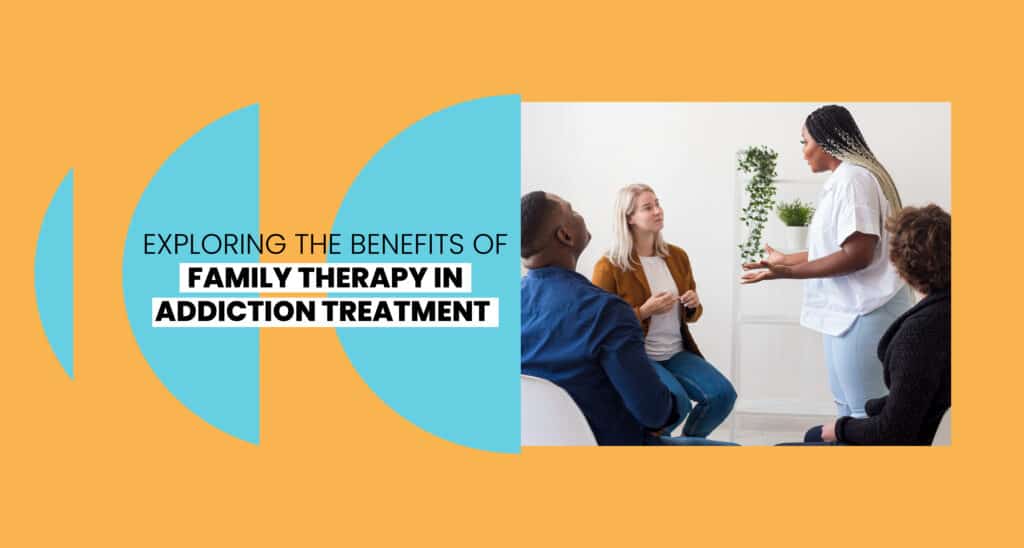Addiction is a challenging problem that affects not just the person using drugs but also their family. Family therapy has become essential in treating addiction because it looks at the whole family’s needs. In this blog, we’ll talk about why family therapy is so helpful in addiction treatment and how it can make things better for everyone.
What is Family Therapy in Addiction Treatment?
Family therapy in addiction treatment involves structured sessions with a trained therapist, where family members come together to address the dynamics and issues related to the addiction. This therapeutic approach aims to:
- Improve communication among family members
- Resolve conflicts
- Strengthen family bonds
- Support the recovery process of the individual with addiction
By involving family members in the treatment process, family therapy helps create a supportive environment conducive to recovery.
The Importance of Family Involvement in Addiction Treatment
Enhanced Support System
One of the primary benefits of family therapy is creating a robust support system. When family members are actively involved in the recovery process, the individual struggling with addiction feels more supported and less isolated. This enhanced support system can significantly improve the chances of successful recovery.
Improved Communication
Addiction often leads to strained relationships and poor communication within the family. Family therapy sessions help improve communication skills among family members. Therapists work with the family to develop healthier ways of expressing feelings, addressing concerns, and resolving conflicts. Improved communication helps to rebuild trust and strengthen family bonds, which are essential for long-term recovery.
Better Understanding of Addiction
Family therapy provides an educational component that helps family members better understand addiction as a chronic disease. This knowledge dispels myths and misconceptions about addiction, reducing blame and stigma. When family members understand the nature of addiction, they are better equipped to support their loved one in recovery.
Addressing Co-Dependency
Co-dependency is a common issue in families affected by addiction. Family therapy helps identify and address co-dependent behaviors, enabling family members to develop healthier relationships. By setting appropriate boundaries and learning to care for themselves, family members can better support the recovery process without enabling the addiction.
Benefits of Family Therapy in Addiction Treatment
Reduces Relapse Rates
One of the most significant benefits of family therapy is its ability to reduce relapse rates. Research shows that individuals who have strong family support are less likely to relapse compared to those who do not have such support. Family therapy helps create a stable and supportive home environment, which is crucial for maintaining sobriety.
Provides Emotional Healing
Addiction can cause emotional wounds that affect the entire family. Family therapy provides a safe space for family members to express their feelings and heal from the emotional trauma caused by addiction. This collective healing process is vital for the overall well-being of the family and contributes to the recovery of the individual with addiction.
Enhances Treatment Engagement
When family members are involved in the treatment process, individuals with addiction are more likely to stay engaged in their treatment programs. The presence of family support provides motivation and encouragement, making it easier for the individual to adhere to their treatment plan and work towards recovery.
Builds a Stronger Family Unit
Family therapy focuses on building a more robust, healthier family unit. By addressing the root cause and improving communication, family therapy helps to create a more cohesive and resilient family. This strengthened family unit can better withstand the challenges of addiction and support each other in maintaining long-term recovery.
Teaches Coping Strategies
Family therapy equips both the individual with addiction and their family members with effective coping strategies. These strategies help family members manage stress, handle triggers, and navigate the complexities of addiction recovery. Learning to cope effectively reduces the likelihood of relapse and promotes a healthier, more supportive family environment.
How Does Family Therapy Work?
The Role of the Therapist
In family therapy, the therapist is crucial in facilitating discussions, mediating conflicts, and providing guidance. The therapist helps family members understand their duty in the addiction and recovery process and works with them to develop healthier patterns of interaction.
Structured Sessions
Family therapy typically involves structured sessions that follow a specific agenda. These sessions may include individual and group meetings, allowing for personal reflection and collective discussion. The therapist may use several therapeutic techniques, such as cognitive-behavioral therapy (CBT) or solution-focused therapy, to address the family’s unique needs.
Setting Goals
Goal setting is an essential component of family therapy. The therapist works with the family to set realistic and achievable goals for the therapy process. These goals may include improving communication, resolving specific conflicts, or developing a plan for ongoing support. By setting and working on these goals, the family can track their progress and celebrate their successes.
Frequently Asked Questions About Family Therapy in Addiction Treatment
What Can We Expect from Family Therapy?
Family therapy sessions are designed to be a safe and supportive environment where family members can express their thoughts and feelings openly. You can expect engaging discussions about the impact of addiction on the family, learning new communication skills, and developing strategies for supporting each other in recovery.
How Long Does Family Therapy Last?
The duration of family therapy usually depends on the specific needs of the family and the severity of the addiction. Some families may benefit from a few sessions, while others may require continued therapy for several months. The therapist will work with the family to determine the appropriate length of treatment.
Does Insurance cover Family Therapy?
Many insurance plans pay for family therapy as part of addiction treatment. But it’s important to ask your insurance company exactly what they cover. Some treatment centers also offer discounts or help with costs to make therapy affordable for everyone in the family.
Can Family Therapy Help if Only Some Family Members Participate?
While it is ideal for all family members to participate in therapy, it can still be beneficial even if only some members are involved. The participating members can learn new skills and strategies to share with the rest of the family. The therapist can also guide and encourage other family members to join the therapy process.
Conclusion
Family therapy is a tool in the treatment of addiction, offering numerous benefits that enhance the recovery process for both the individual and their family. By improving communication, reducing relapse rates, and fostering emotional healing, family therapy helps create a supportive and resilient family environment. If you or a loved one is struggling with addiction, consider incorporating family therapy into your treatment plan to maximize the chances of successful and long-lasting recovery.
By understanding and leveraging the benefits of family therapy, families can navigate the challenges of addiction together and emerge more robust and more connected. If you’re looking for a comprehensive approach to addiction treatment, explore the possibilities that family therapy has to offer and take the first step toward healing and recovery.









